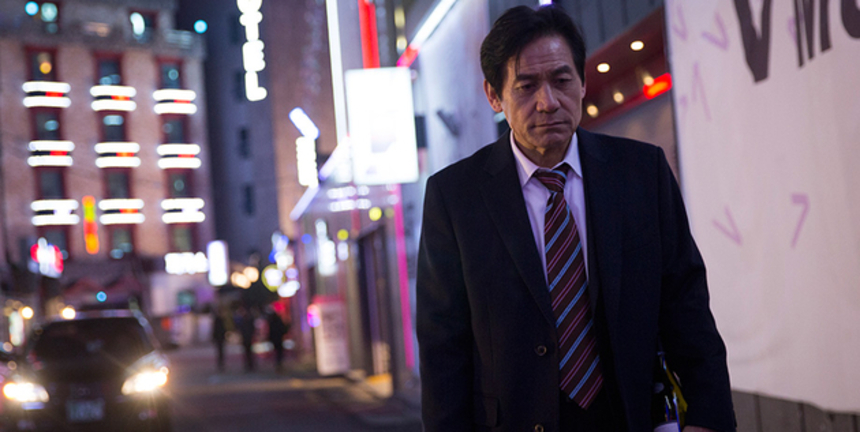Venice 2014 Review: Mortality And Desire Mingle And Dance in REVIVRE

Returning for his 102nd feature, the indefatigable Im Kwon-taek continues his move away from period and cultural fare with the melancholic Revivre, pairing up once again with the equally venerable screen legend Ahn Sung-ki. Somberly shot and deliberately paced, Im's latest is a thoughtful and pellucid perlustration of mortality and desire.
Pharma company marketing director Mr. Oh leads a successful career but when his wife enters the final stages of cancer his priorities begin to change. Though he cares tenderly for his sick partner, he finds himself distracted by Ms. Choo, a beautiful subordinate at work. Following a four-year battle, his wife succumbs to her illness, yet work obligations draw him right back into a major project, to the point of holding a design meeting during her wake. He has trouble concentrating on his duties, yet it is the alluring form of his work companion and not the specter of his fallen bride that troubles him.
'Hwajang,' the Korean title of Revivre, is a homonym that means both 'cremation' and 'makeup'. While this double definition lends itself well to the film's focus on beauty and its fleeting nature, the international title, a French word meaning 'to live again', is just as useful a key to unlocking the central protagonist's motives and desires. As his wife slowly shuffles off her mortal coil, Mr. Oh's youthful desire returns to him, fixating on the beguiling Ms. Choo. While his spouse inches closer and closer to death, his wish to recapture his youth and vigor steadily intensifies.
Mr. Oh, far from being predatory, is kind and thoughtful to those around him, including Ms. Choo, but his passion returns bit by bit, first with reluctant glances across the office, which make may for longing stares, and eventually full blown fantasies, most notably in a scene during which he mounts his frail other half. The male gaze, a term seared into my mind in college, plays a pivotal role in Revivre, particularly in its ability to empower both the observer and the observed. Yet things play out in a refreshingly unexpected fashion in Im's film, with the bulk of the narrative given over to missed connections, implied emotions and inner moral struggles.
Demanding a performer who can convey a complex range of subtle emotions not with words but through eye contact, facial expressions and the slightest of body movements, the role of Mr. Oh is a challenging one that only someone of Ahn's experience and innate sensitivity could pull off, and he does so magnificently. Speaking through his candid eyes and relaying inner turmoil through imperceptible shrugs and tired slouches, Ahn shines in a role that demands the full range of his abilities, while being reminiscent of a similar turn in Shin Yeong-shick's The Fair Love (2009). As Ms. Choo, Kim Gyu-ri, who previously starred in Im's Low Life (2004), is alluring, classy and smart. An independent woman with poise and a soft smile, it's easy to understand the spell she unwittingly casts over Mr. Oh.
Shot in winter and almost always on overcast days, Revivre sports a funereal air that is amplified with a muted color palette standing in stark opposition to the erotic fixations that pervade its narrative. Yet by abstaining from warm colors and a more intimate mise-en-scene, the film feels more considerate and relatable than many of its peers.
By juxtaposing the entrenched 'carry one' style of Korean work life (where the death of a loved one does not necessarily entail the privacy and time for mourning that might be expected elsewhere) with Mr. Oh's pensive mid life crisis, Im creates a natural tension that does as much to exposure the thoughts of the film's central character as it does the foibles of modern Korean society.
In one scene, a melancholy chamber piece rings out in the night as Mr. Oh slowly shuffles through one of the many love motel alleys of Seoul. Yet while these are generally brightly lit, or at the very least colorful, this particular street is awash in a cold blue tint, the neons lending a pallid air to our protagonist's already tortured countenance. Scenes such as these - simply, but effectively shot, and sporting a great lead turn - make Revivre a film that is at once unassuming and complex. A fine return following a four-year absence for the legendary filmmaker, one hopes that Director Im will grace us with another work (and even longer filmography) once again before long.







